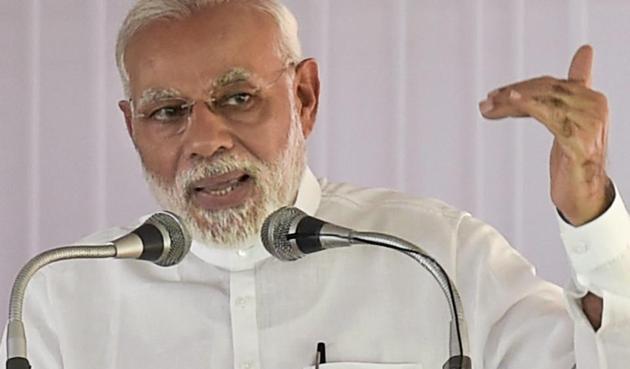Why the economy can’t be the narrative for Narendra Modi in 2019
The latest consumer confidence survey by the RBI shows the double-whammy of demonetisation and GST is far from over. What is also more clearly revealed is that a growing disconnect is strikingly visible between what people expected and what they actually got.
The Reserve Bank of India (RBI) has predicted a softening of inflation and an acceleration in the pace of economic expansion through fiscal 2018-19. The central bank’s forecast coupled with its decision last week to keep the key lending rate – the repo rate – unchanged has, for now, renewed hopes that things can get better.

Amid cheers from the market and investors that made the headlines, few took note, however, of another important report the RBI released on the same day it announced the monetary policy — the central bank’s latest survey of consumer confidence that paints a less than enthusiastic, if not, borderline picture of economic pessimism.
The survey, in essence, tells us that consumer confidence in top cities has waned, yet again. The sentiment emerging from the January-March 2018 period, after a temporary improvement in the preceding quarter, has now become subdued in terms of the prospects for jobs, growth in income and the economy.
The survey tracks households’ perceptions and expectations on the general economic situation, jobs, prices, income and spending, in New Delhi, Mumbai, Bengaluru, Kolkata, Hyderabad and Chennai. The latest round covered 5,279 respondents.
“The current situation index (which is based on perceptions) has remained in the pessimistic zone since March 2017,” the RBI said in its note on the survey. “The future expectations index followed a similar trajectory.”
The results show the double-whammy of demonetisation and GST is far from over. What is also more clearly revealed is that a growing disconnect is strikingly visible between what people expected and what they actually got.
Sample this:
At the time, prime minister Narendra Modi made the surprise announcement about scrapping high value currency notes in November, 2016, about half of the respondents participating in the RBI Survey had said the economic situation had improved, while the other half found it either unchanged or worse.
Read| The great Indian disagreement on demonetisation, GST: Why economists are split
Today, only a third feel the economic situation has improved, while two-thirds of the respondents feel it has remained the same or worsened. In November 2016, 63% of the respondents expected the economic situation to improve. That number has steadily slipped to 48% in March 2018. There is a growing pessimism around jobs and income growth among respondents in these cities, which account for a sizeable chunk of the demand for consumption and constitute a key source for the generation of new employment.
In November 2016, 31% of the respondents said the job market had worsened from a year ago. That number has jumped to 43% in the latest round of the survey. Similarly, only 24% reported an improvement in their incomes, while 25% said their incomes had actually declined and 51% of the respondents had seen no change. This is further reflected in the gap between how people spent and how they expect to spend on nonessential purchases – an indicator of growing economic well-being. This too has shrunk by a few percentage points. Worse, an overwhelming proportion of respondents said the rate of inflation has not only got worse from a year ago, but prices will keep rising faster in the year to come – an expectation that runs contrary to the Central bank’s forecast.
While making macroeconomic forecasts, the RBI will go by data, and not perceptions, the findings of the consumer confidence survey do offer valuable insights into the state of play. It points to how consumer sentiments, which recovered sharply after Modi came to power, but have steadily deteriorated since the impact of demonetisation became apparent and got worse by the chaotic introduction of GST.
Recovery lacks sustained momentum
By the end of 2017, things were looking to turn around, on the back of a sharper recovery in the global markets and the ruling BJP‘s victory in Gujarat. But it appears now that those gains were perhaps temporary.
Subdued consumer sentiments, and therefore the lack of acceleration in consumption demand, are holding back companies from investing in new projects and expanding their activities. As the Quartz reported last week, citing data from the Centre for Monitoring Indian Economy, Indian companies shelved a record number of projects in 2017-18. These involved investments worth ₹7.7 lakh crore, or $117 billion, of which 40% were scrapped in the quarter ended March alone. The report also said March was the worst month in terms of new purchase orders from managers at Indian companies.
This is further corroborated by the sharp deceleration in the government’s tax collection through the last quarter. Although March data is yet to be released, data for February show there was an absolute decline from a year ago, which is why the government’s fiscal deficit in the April-February period climbed to 120% of the revised target for the full financial year 2017-18.
If the RBI survey and other data sets relating to investment and sales correctly mirror the economic sentiments of the urban middle class, then the economy and its growth story (or the lack of it) cannot be the main narrative for Prime Minister Modi’s re-election bid in 2019.
Conversely, therefore, it can be argued that the non-performing economy is what the Opposition can most likely bet on and challenge in the run-up to the next general election. Bluntly put, Modi’s re-election strategy for 2019 will have to depend on factors other than those that relate to India’s economy.
Read | There’s no shortcut to growth: Indian economy’s revival will need more than temporary stitches
(The author is Editor at Large, Hindustan Times. He tweets as @rajeshmahapatra)






